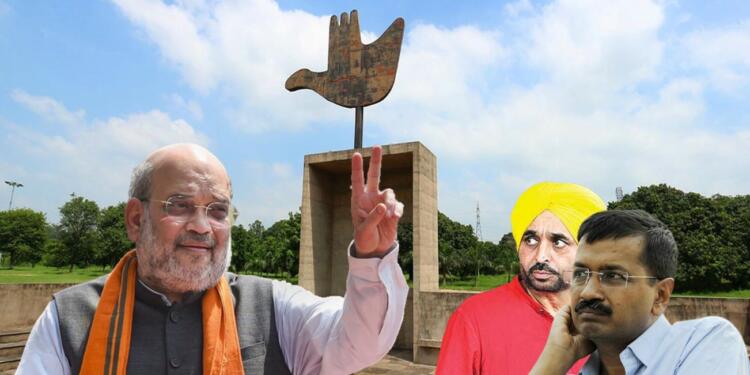A major political controversy has shaped up in the state of Punjab with AAP, SAD and Congress speaking up against the Centre’s plan to bring Chandigarh administration employees under central civil services rules.
So, what is this announcement all about? And what does it mean for Chandigarh administration employees? Let’s find out.
Political controversy shaping up in Punjab
Delhi Deputy Chief Minister and senior AAP leader Manish Sisodia tweeted, “From 2017 to 2022 Congress ruled Punjab. Amit Shah didn’t take away Chandigarh powers then. As soon as AAP formed Govt in Punjab, Amit Shah took away Chandigarh’s services. BJP is scared of AAP rising footprint.”
From 2017 to 2022 Congress ruled Punjab.
Amit Shah didn't take away Chandigarh powers then.
As soon as AAP formed Govt in Punjab, Amit Shah took away Chandigarh's services.
BJP is scared of AAP rising footprint. https://t.co/8Dnex4rcWG
— Manish Sisodia (@msisodia) March 27, 2022
The remarks by the AAP leader followed an announcement by Union Home Minister Amit Shah that service conditions of employees of Chandigarh UT administration will now be governed aligned to that of central civil services.
Home Minister Amit Shah says service conditions of employees of Chandigarh Union Territory administration will now be aligned to that of central civil services and this will benefit them in 'big way'
— Press Trust of India (@PTI_News) March 27, 2022
Other political parties in the state like Congress and SAD too have opposed the move.
What does the change mean?
Let’s keep politics aside for a moment and understand what the change really means.
Presently, 16,000 Chandigarh administration employees, including those with the municipal corporation, are governed by the Punjab Services rules.
UT adviser Dharam Pal clarified, “The rules will be applicable only on regular employees of the administration and not on deputation to the city from other states like Punjab and Haryana.”
However, there was a long-pending demand from a major chunk of the Chandigarh administration employees to apply central services rules to them. However, their demand wasn’t accepted despite protests by unions and support from Chandigarh MP Kirron Kher.
Chandigarh administration employees stand to benefit
The application of central services rules is a major relief for Chandigarh administration employees. The Punjab Services rules do not give them the kind of benefits and service conditions that the central civil services rules have to offer.
While making the big announcement, Union Home Minister Amit Shah said that it will increase the retirement age of employees from 58 to 60 years. The Union Home Minister added, “Now, female employees will get two years of child-care leave instead of one and professors in colleges will retire at 65 years of age.”
And then, there are some other key benefits also. Health and education department officials will get a substantial increase in their salaries. Rakesh Kumar, general secretary, coordination committee of the government, MC employees and workers, Chandigarh, explained, “Now, employees will also get automatic and time-bound pay grade upgrade after 10 and 20 years of service, even if they don’t get promoted. Also, some additional allowances are provided under the central services rules.”
Read more: Chandigarh mayor elections herald BJP’s massive win in Punjab elections
While the move is being criticised by the opposition, senior BJP leader and former MP Satya Pal Jain said, “They should be happy that UT employees will get better benefits. The status of employees in regard to Punjab will not change.”
Chandigarh administration employees are the backbone of the city’s functioning. And they have evidently done a great job, which is why Chandigarh is quite popular in North India. Politics apart, the move to bring Chandigarh administration employees under central rules is actually a step in the right direction.


























If I were a conspiracy theorist, I would say, it is the political Chanakya Amit Shah’s ploy. He suggested what is good for thousands of Punjab employees, keeping in mind that AAP will oppose that idea. Now not just the thousands of employees but their family members also will hate AAP.